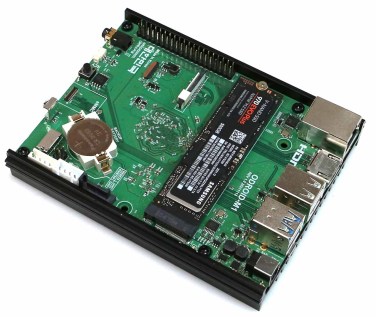Odroid-M1 SBC

The board is made by Hardkernel and is the latest device introduced in late March of 2022. The specs for this board are impressive:
- Rockchip RK3568B2 CPU
- LPDDR RAM un 4GB or 8GB boards
- M2 NVMe M-Key PCIe3 2-Lane
- SATA 3.0 (native not USB)
- SATA Power (5 volt only)
- 2 – USB 2.0 ports
- 2 – USB 3.0 ports
- 1 – HDMI 2.0
- Ethernet (10/100/1000)
- SPI 16 MiB
- 1 eMMC module socket
- 1 Micro SD Slot
- RTC Backup Battery Holder
The board can be booted from eMMC, SD Card, USB Device, SATA drives or NVMe device. Two operating systems are provided by default Android and Ubuntu 20.04 LTS.
An optional NVMe to PCIe3 adapter allows the addition of other PCI3 devices, and tests have been performed by HardKernel with 10G ethernet boards, while full 10 Gigabit/sec transfer is not quite there 2.5 G is easily achievable with this board.
The CPU is an quad core ARM Cortex-A55 processor with low power consumption and high efficiency operation at 2GHz. CPU and GPU performance is comparable to to the Ordroid-C4. I will be posting benchmarks with the video that accompanies this review.
The multi-device boot is provided by Petitboot which is pre-installed into the on-board 16MiB of SPI-Flash Memory. Work is still underway to add the direct device support for ease of loading operating systems onto your choice of device type, but there are workarounds described in the HardKernel Forums.
Benchmark Results
Benchmark results show the Odroid-M1 runs about 25-50% of the 10th gen Intel Nuc I use to benchmark my other distro reviews. The NVMe is a Samsung 970 EVO (PCIe 3 device) but is throttled to 50% of its potential. Why? The Odroid-M1 uses a 2-lane NVMe instead of the standard 4 lanes.
Is the Odroid-M1 a Desktop Replacement Device?
There are four distribution choices available:
Ubuntu 20.04
Ubuntu 22.04
Debian 10
Debian 11
Ubuntu 22.04 is considered incomplete and experimental by the Hardkernel folks. Also it is only made available through a special link at present. I did not test it.
Debian 10 is too old and very close to its End of Life date so I did not bother to test it.
Ubuntu 20.04
When using Ubuntu 20.04 the standard distro for the Ordoid-M1 the user experience is at times good and at times sluggish, These periods seem to come and go at random which may indicate background processes could be the culprit. One last point when adding users to Ubuntu, after setting up the new user and attempting to login, the screen pauses for just a second or two then flips back to the login screen again. No error message is logged in any of the standard places. Pressing the gear button, on the GDDM screen I noticed the users default was X11, choosing Gnome Wayland solved the problem.
Debian 11
Next I installed Debian 11 which is labeled a “Work in Progress”, the feel of the machine seemed to be better, the performance improvement was noticeable.
Leaving the machine idle will cause the machine to go into hibernate even though the power setting in Gnome Settings shows that the machine should only blank the screen. There is no way that I know of on the odroid-m1 to exit hibernate (no power button), so you have to reboot the machine by pulling the power connector. Debian scripts to disable hibernate solves that problem.
Answer
Yes, I think so on Debian 11, however I would not recommend using Ubuntu 20.04.
Price
The ODROID-M1 are: $70 for the 4GB version and $90 for the 8GB version (USD).

